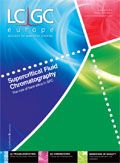Event News
Upcoming Events
SFC 2010
SFC 2010 — the 4th International Conference on Packed Column SFC — will take place in Stockholm, Sweden at the Radisson Blu Royal Viking Hotel from 15–16 September 2010. The organizers, The Green Chemistry Group, aim to attract leading practitioners in SFC from research institutes, industry and academia across the US and Europe. Shalini Andersson of AstraZeneca in Molndal, Sweden and Eric Francotte of Novartis in Basel, Switzerland will co-chair this year's event.

The conference was launched because of the lack of SFC presentations and posters at the standard industry conferences. Most meetings downplayed the significance of SFC as powerful new technology that could improve not only analytical and preparative chromatography, but aid the development process in the pharmaceutical, cosmetic, petrochemical and food industries.
After speaking with other scientists in the supercritical fluid community, Todd Palcic, then vice president of Thar Instruments, realized that another broad, all-inclusive supercritical symposium would continue to disappoint those scientists and their employers who desired an industry-led event. To meet this need, he contacted potential sponsors and found them receptive to the idea of a meeting where the customers present their chemistry problems and SFC solutions.
Palcic founded The Green Chemistry Group as a platform for new technology meetings and promotion of environmentally sustainable chemical research and development throughout the world. Board members include J. David Pinkston, Larry Taylor, Larry Miller, Francis Mannerino, Frank Riley and Nicholas Mitchell. The group is located in Pittsburgh, Pennsylvania, USA and can be found on the web: www.greenchemistrygroup.org
SFC 2010 will feature a scientific programme of oral and poster presentations and an exhibition. Retired Professor Larry Taylor and Amgen scientist Larry Miller head the Scientific Committee. Topics include natural product analysis, hydrocarbon analysis, enantiomeric separations and mass-directed purification of discovery compound libraries. They currently seek abstracts from presenters working on new research or applications in the field of supercritical fluid chromatography. The deadline for oral presentations is 30 June 2010 and 15 August 2010 for posters.
Vendors can take advantage of the opportunity to showcase the latest SFC technology to a diverse audience by exhibiting at a booth, sponsoring student travel or giving workshops. Current sponsors include Agilent, Amgen, LCGC Europe, Pfizer, PIC Solution, Regis Technologies and Waters.
The meeting closely follows SPICA — 13th Symposium on Preparative and Industrial Chromatography and Allied Techniques, which is also held in Stockholm this year from 12–15 September 2010.
As supercritical fluid chromatography grows in stature as a cutting-edge technology, this conference provides a forum for new developments and applications. To ensure the global nature of the SFC series of meetings, the next conference will likely be held in Asia for the first time in 2011.
For further information please contact Michelle Besanceney on +1 412 805 6296, e-mail: register@greenchemistrygroup.org, or visit www.greenchemistrygroup.org
6–10 September 2010
16th International Symposium on Separation Science
Conference Halls, National Research Council Headquarters, Rome, Italy
Contact: Danilo Corradini
Tel: +39 69 067 2254
Fax: +39 69 067 2269
E-mail: danilo.corradini@imc.cnr.it
Website: www.16ISSSRome.it
12–16 September 2010
28th International Symposium on Chromatography
Faculty of Pharmacy, Valencia, Spain
Contact: Yolando Pico
Tel: +34 96 352 4889
Fax: +34 96 394 2558
E-mail: yolando.pico@uv.es
Website: www.isc2010.eu
18–19 October 2010
21st Annual International Light Scattering Colloqium
Four Seasons Biltmore Resort, Santa Barbara, USA
Contact: Lindsey McGowan
Tel: +1 805 681 9009 ext 2010
E-mail: lmcgowann@wyatt.com
Website: wyatt.com/events/ilsc/21st-annual-international-light-scattering-colloqium.html
18–21 October 2010
XII Chemometrics in Analytical Chemistry Conference (CAC 2010)
Congress Centre, Antwerp, Belgium
Contact: Luc Van't dack
Tel: +32 3 265 2343
E-mail: luv.vantdack@ua.ac.be
Website: www.ua.ac.be/ca2010
27 October 2010
Recent Advances in Sample Preparation Techniques
Runcorn Conference Centre, Chester, UK
Contact: Graham Mills
Tel: +44 23 92 842115
Fax: +44 23 92 842115
E-mail: graham.mills@port.ac.uk
Website: www.sep-sci.org.uk
Send any event news to Doug Kitson at dkitson@advanstar.com

.png&w=3840&q=75)

.png&w=3840&q=75)



.png&w=3840&q=75)



.png&w=3840&q=75)











